All Forum Posts by: Brett P Swarts
Brett P Swarts has started 214 posts and replied 252 times.
 Post: How Brett Started In Real Estate In The First Place
Post: How Brett Started In Real Estate In The First Place
- Specialist
- SAINT AUGUSTINE
- Posts 261
- Votes 26
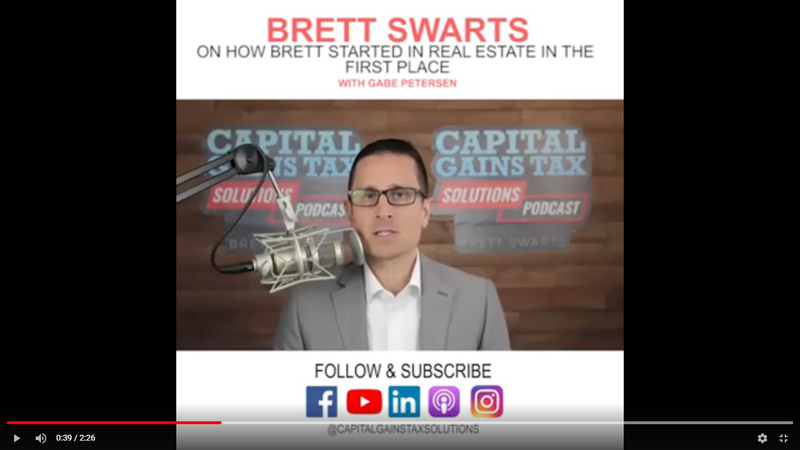
Gabe Petersen:
Here in the Real Estate Investing Club. We always start with stories. So why don't you take us back to the beginning? How did you get started in real estate in the first place?
Brett Swarts:
Yes, it wasn't always easy. You know, I started out at a company called Marcus and Millichap. Buy and sell multifamily properties here in Northern California. And it was in 2006 when I started and adjust when I started to get some momentum. Everything hit the fan, and that was in 2008. So I went from making just a little bit of money in commercial real estate, barely survived with my wife and our daughter at home, living with my brother in his condo to making next to zero. So I did what every good entrepreneur, real estate broker, or agent wants to do, you figure out a way to keep the dream alive. And that's when I got a side job hustle at a place called Cheesecake Factory. So by day, I will be making cold calls. And by night, I've been wearing the exact same tie that I had Marcus and Millichap to serve cheesecake nights and weekends.
You see what was happening was the crash happened and that hurt not only agents but also our clients. So I had to figure out a way to kind of make it in the business, to be able to keep my wife, our goals, keep my wife home full time to be able to raise our daughter. Also, we wanted to have more kids but I don't know if you've ever been so scared, Gabe, where you didn't know what you're gonna do, right? And people are telling you to go get a real job and go figure it out. And I'm like, I love what I'm doing. It's not just a job. It's my career. It's my calling. I love helping people solve problems in real estate. But just at that moment, my manager when things felt like they were the darkest or the toughest financially, my manager brought in a gentleman to speak on what's called the Deferred Sales Trust. That changed my real estate career forever because all of a sudden, I had something that was an alternative to a 1031 and I was able to help my clients who felt trapped by capital gains tax. Fast forward, this is what I do now, I coach and train folks on how to do it. And I also invest personally in real estate and still do 1031s for clients when the market makes sense. But mostly we just focus on the Deferred Sales Trust.
Learn more about Deferred Sales Trust
Visit: www.capitalgainstaxsolutions.com
 Post: What Brett Recommend an Operator That's getting Ready to Sell The
Post: What Brett Recommend an Operator That's getting Ready to Sell The
- Specialist
- SAINT AUGUSTINE
- Posts 261
- Votes 26
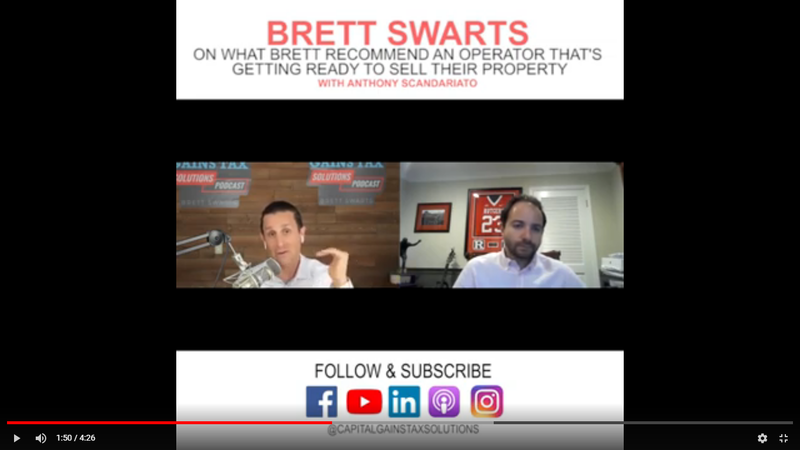
Anthony Scandariato:
What would you recommend for, let's say an operator that's getting ready to sell their property? And they want to consider the strategy, just given the market fundamentals right now? When should they engage?
Brett Swarts:
That's a great question. First of all, we don't charge a dime unless you do the deal. So, let's say you're selling a property and you're like, I'm just curious to see who's gonna work for me. But I want to pay all these tax attorneys and CPAs to work all this out. It's for capital gains tax solutions jumps in, and we're going to give you clarity on your options. We're going to tell you the 1031, we talked about the Delaware Statutory Trust, by the way, I've closed Delaware Statutory Trust, I've closed 1031s, have closed Deferred Sales Trust. You want to always make sure you're working on these actually close the deals. That's what we've done. So come to us, go to capitalgainstaxsolutions.com, and you can apply for a no-cost consultation call. You're gonna answer some basic questions like what's your basis? What do you buy for? What do you pay for it? How much debt do you have? What are you planning to sell it for? But we need to do it before the closing of escrow. We need to be early, ideally released 30 or 60 days early, we definitely need to be before the buyer removes all contingencies, especially for a business high-end primary home, which we just did a deal in Cupertino $3.1 million sale for a gal who was facing a $400,000 in capital gains tax above and beyond her 121 exclusion, which if you live there to the last five years, 250 or single 500 if you're married, but she sold took that illiquid asset deferred all the tax and now she's living off the interest. We had to do that before the closing of escrow. She doesn't have a 1031 option right. Now, if investment real estate you have a 1031 option so you can save a failed 1031 exchange. That being said, you want to work with an accommodator who's actually done deferred sales trust, right. Don't work with the old blockbuster accommodator who's just gonna say no, make sure you're getting with someone who's looking out for your best interest and has given you the Netflix option, which is the new better way to do things. At least have the option.
By the way, you can have all of that and still do your 1031. If it fails, no problem. I mean, if it doesn't fail, you do your 1031 no problem. You don't owe us anything, right. So that's the first thing. If you're a syndicator, you have what's called carried interest and a lot of folks syndications that we work with before they meet us. They're all just everyone's paying the tax coming in with the money. They're buying this deal. They're owning it, managing it, selling it, and everyone's paying the tax again. So every time, Anthony, you're losing 30 to 50% of that gain with the depreciation recapture in the capital gains tax given the deal, right on the end, because a lot of people are selling the high-end primary home, selling the business, selling the cryptocurrency, right selling these highly appreciated assets, which are not 1031 eligible into syndication for real estate. So they pay the tax they show up and then you go do the deal. Well, the first thing you can do as a syndicator, say, don't do that. Use the deferred sales trust, let's do a DST with that sale. And then immediately the next day they can they could fund your syndication. Okay, up to 80% of the deal. So let's say with a million dollars in the trust $800,000 could go into Anthony's. We have to keep a little bit of liquidity into liquid diversified investment grade security. So that's a little bit of a downside for it versus 100% with the 1031. But that's okay, too, because the bank's gonna say hey, you're qualified for a loan, which is good. It's good to have some liquidity too. So that being said, that is a little bit of something people are like, I don't really like that like to have 100%. But that being said, we need to do that now. Now on the syndication side, when you go to sell some people might say I'm still lucid I block cluster I don't want to do this, this deferred sales trust. No problem, like no, it doesn't have to move. So in a 1031 exchange, typically the whole entity must move meaning that's why most syndicators don't do a 1031 because they got five people who want to get out. And they're like, we can't have the whole entity move. So they end up just paying the tax. Well, guess what, Anthony, you can do your own deferred sales trust, and a couple of other partners could do their own not commingled with each other completely separate. And the other 10 investors could just pay their tax, no problem, right. So it's completely flexible in that manner. So I'll pause there to make sure that answered your question.
Learn more about Deferred Sales Trust
Visit: www.capitalgainstaxsolutions.com
 Post: Getting to Know Brett Swarts with Brandon Duff
Post: Getting to Know Brett Swarts with Brandon Duff
- Specialist
- SAINT AUGUSTINE
- Posts 261
- Votes 26
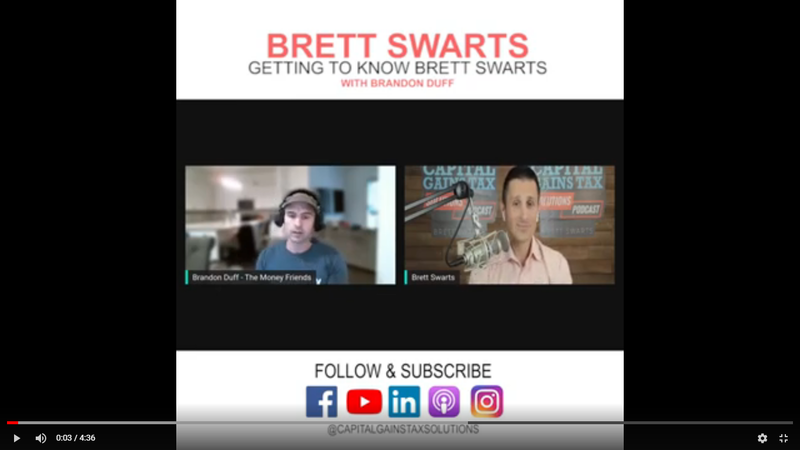
Brandon Duff:
So for those that don't know, can you give us a little bit of background about you and who you are?
Brett Swarts:
Yeah, thanks, Brandon, for having me on the show. So most high-net-worth individuals, they struggle with capital gains tax when they go to sell commercial real estate, a primary home, or a business. So we now focus on helping people defer those taxes. We'll get to that in a minute. But it started out with having people who are my clients get absolutely hammered when it came to selling real estate, and having to use the 1031 exchange to chase properties and overpay for properties. You see, I started out my career, I joined a company called Marcus and Millichap in 2006, helping people buy and sell a multifamily property. And at the time, it was a really interesting time because the marketplace was really highly appreciated, there wasn't a lot of inventory, lots of 1031 exchanges going on. And it was kind of known as a seller's market. That was great for us as we were learning and I was brand new to the industry and if you don't know, in brokerage, you sink or swim, you then make 100% commission or you don't, I was just married, just out of college and is just starting to get going in my career. But it wasn't always easy. You see, you know, when you're facing folks who've been in the industry for, you know, 20 years, 15 years, 5 years, 10 years, they're ahead of you. So you're kind of like the apprentice, just learning about the industry. So I started to get some momentum and I started to learn, but I was literally making like zero to like just, you know, $20,000, $30,000 wasn't always easy, right? Very challenging, getting my feet underneath me, but then the market completely crashed right in 2008 it was like a brick wall. And not only did my, you know, barely income, barely survive, business kind of go to zero. But then I saw a lot of my clients either lose half of their wealth or some loss everything, as the banks were to foreclose on some of these properties. And we tried to identify what happened and why. And what we found was a lot of people had overpaid via the 1031 they had taken on too much debt, they had sold the high brand and bought higher 180 days later with equal or greater debt and or even more debt. That became a nightmare for a lot of folks.
So we said, there's got to be a better way. So we started to look around and also personally, I started to look around, like how am I going to make in this business and so I did what every good, you know, entrepreneur business person does, who has a dream and loves what they're doing, I wouldn't get a side job. So I got a side job working at a place called Cheesecake Factory where I served cheesecake and I had studied in college, two degrees and a minor had been really successful in sports, I was able to play basketball on scholarship. So I was used to having really high success rate, but it was not easy. I mean, I don't know if you've ever been so scared branding, where you're not sure how you're going to feed your family or you know, or if you're gonna have to move in with your brother too with your kid and to their small smart condo. Well, that's where I was at. I was really scared really just trying to make it in the business. So I did decide side job on the weekends and nights. So by day, I've been making calls at Marcus and Millichap trying to help people, you know, keep their properties versus the banks and or lower their overall income, or I'm sorry, trying to get more income by getting more renters or renegotiate their taxes. By night, I'd be selling, cheesecake to keep the bills from piling too far up. But just at the right time, my manager brought in a gentleman to speak on what's called the Deferred Sales Trust. It was a moment that changed everything for me. Basically what he went on to say was, look, the old way of doing things is like the 1031, it's like a blockbuster, right? And we can get into that moment and new ways like Netflix. And had they done it like Netflix. They could have gotten, you know, rid of other debt they could have not have overpaid, and they could have diversified and been liquid with the capital. And so the plan was okay, this is amazing, but people don't know about it. So I started to educate my clients. I started to give referrals to my business partner now. And as we grew, my business grew. And as I learned more and added more value, my business grew and fast forward now. I mean, I'm still in commercial real estate, but I also have a company and its Capital Gains Tax Solutions, where we educate brokers, syndicators, operators, and high net worth individuals so they never have to feel trapped by capital gains tax ever again.
Learn more about Deferred Sales Trust
https://capitalgainstaxsolutios.com
 Post: How Deferred Sales Trust Different From a 1031 Exchange
Post: How Deferred Sales Trust Different From a 1031 Exchange
- Specialist
- SAINT AUGUSTINE
- Posts 261
- Votes 26
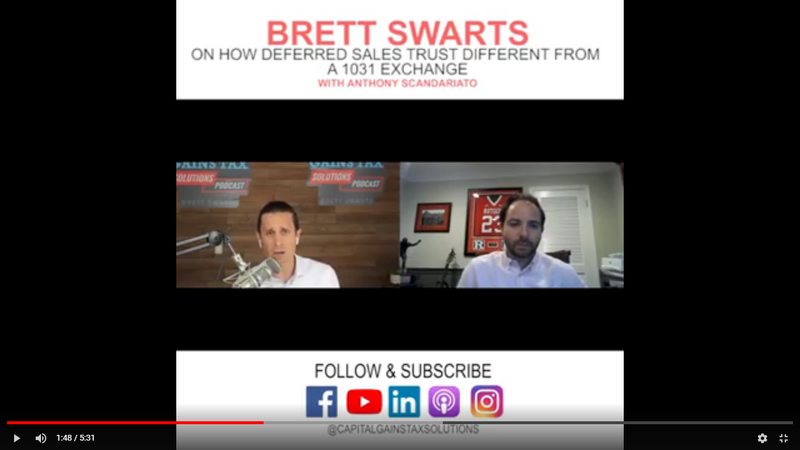
Anthony Scandariato:
How is it different, for a lot of my listeners or someone with experience, how is it different from a 1031 exchange? What are the main differences there?
Brett Swarts:
Before we jump into that, I'll give you a little bit of context. I actually started out my career as a Real Estate Broker at a company called Marcus and Millichap, helping people buy and sell multifamily properties here in Northern California. This was during the 2006-2010 range. And at the beginning of my career, it wasn't easy, I was just trying to make it in the business just learning. And it was really just an apprentice to a mentor, who was, you know, one of the top agents and brokers in Northern California for multifamily. And as I learned, I grew, and just as I started to get some momentum going, something, you know, happened was the 2008 crisis, and a lot of folks will probably remember that. And that was really a turning point in my career, but also a big challenge for a lot of our clients and our clients, we're faced with the toilets, trash liability, but also a lot of debt. Why? Because I had overpaid for properties in the ‘05, ‘06, ‘07 market before the crash. So when everything came falling down, my reality of being in the business was also challenged, because I had to figure out a way to adapt and figure out a way to add value beyond what every other broker was talking about. We also wanted to figure out a way to help our clients, friends and partners and family never faced the challenges that they had to face of losing everything, some of them did, and some of them lost half of their wealth. We actually focused on the 1031 exchange and some of the shortcomings. So as a commercial real estate investor, myself, and broker, we love the 1031 exchange when it's a buyers market when deals make sense, or there's a value add opportunity. Or you can do forced appreciation, increase the rents and do all the things that we love to do as real estate investors. But it's not always that buying opportunity, right.
In fact, the last few years, we've seen this inventory really dropped cap rates, you know, really get low, meaning cash on cash return wasn't very good. The same thing happened in the ‘05, ‘06, ‘07 markets. Then people felt like they were forced to overpay, and so they did the 1031 exchange, identify within 45 days, close within 180. But remember, it's equal or greater debt or equal greater value. So what happened was, a lot of them lost everything. So we set out on a journey and my fellow colleagues in Marcus and Millichap were looking for a solution for it. And just at the right time, a gentleman came in and spoke on this deferred sales trust, who's now my business partner, who is from the financial advising world. And it was kind of a different perspective, but basically took the tool and the secrets that we're about to talk about here in a minute. And I started to apply it to my commercial real estate business. And so helping people buy and sell at any time that they want it to. And so my business started to grow. And I succeeded. 3 years later, I've been a commercial real estate broker. I'm also now the Founder of Capital Gains Tax Solutions, where we actually train brokers, real high-end realtors, syndicators, and financial advisors on how to do this, also that business professionals can add more value, and then clients can escape feeling trapped by capital gains tax.
So we can start with the first secret. The first secret is this, selling and deferring hundreds of 1000s of dollars, or millions of dollars in capital gains tax, how to legally break free from the capital gains tax, and find the freedom to buy and sell whenever you want, without ever worrying about a 1031 exchange ever again, which leads into a deal we just closed in Georgia, just about two months ago, three months ago, now, a gentleman was selling his $7.6 million multifamily property. And he's bought and sold hundreds of properties for 30 years. And his name is Dave. And he's located in Northern California. He has numerous 1031 exchanges. He actually thought he had a deal in North Carolina that he's gonna buy. But he looked at the cap rates, and this is right before COVID-19. He said I don't know if this really makes any sense. I feel like it's at the top of the market. I don't necessarily want to buy this property and overpay for it. And so he had learned about the deferred sales trust about a year ago before this. So he was still kind of skeptical, still kind of looking at it. But then COVID-19 hit and he said I'm all in on the deferred sales trust. And so instead of taking on all this debt, which he had about 4.5 million to replace, he decided to put all of his equity, about 3.1 million into the deferred sales trust. And here's the key. We saved his failed 1031 exchange. He was passed this 45-day identification. And he didn't want to overpay, he really didn't like the deals that he had. We helped him defer 1.1 million in tax. So now the money is sitting at TD Ameritrade Bank of New York Mellon, Charles Schwab some of the largest banks in the world. And then he was also able to put 2 million into hard money lending. So immediately he got out of the real estate market, you got all this powder dry. He's on the sidelines, and now it's hard money lending is getting about 6%. And he's just waiting for a deal to come. And that deal may be in a month or two or six or 12. But his point is, look, Brett, I didn't want to buy and overpay for a property. I didn't want to be forced into a 1031 exchange. I was tired of the toilets, the trash to liability. I'm glad I was able to meet capital gains tax solutions, learn about this deferred sales trust and now I can buy whenever I want and create and preserve my wealth. So I'll pause there because you might have some questions about that first secret.
Learn more about Deferred Sales Trust
Visit: www.capitalgainstaxsolutions.com
 Post: How Deferred Sales Trust Different From a 1031 Exchange?
Post: How Deferred Sales Trust Different From a 1031 Exchange?
- Specialist
- SAINT AUGUSTINE
- Posts 261
- Votes 26
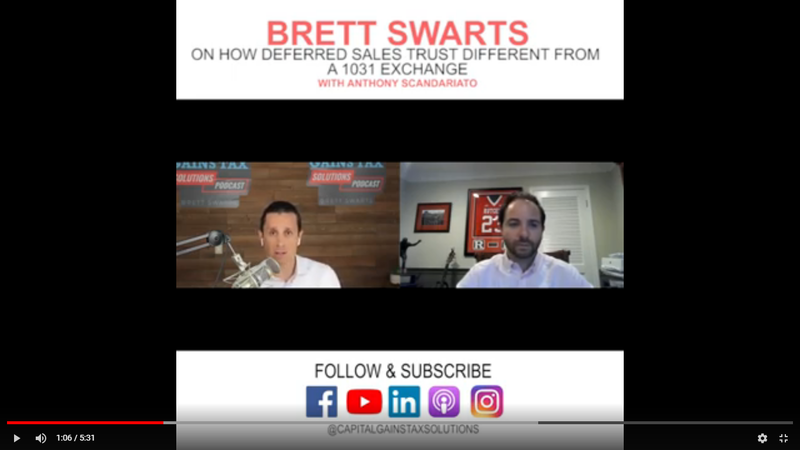
Anthony Scandariato:
How is it different, for a lot of my listeners or someone with experience, how is it different from a 1031 exchange? What are the main differences there?
Brett Swarts:
Before we jump into that, I'll give you a little bit of context. I actually started out my career as a Real Estate Broker at a company called Marcus and Millichap, helping people buy and sell multifamily properties here in Northern California. This was during the 2006-2010 range. And at the beginning of my career, it wasn't easy, I was just trying to make it in the business just learning. And it was really just an apprentice to a mentor, who was, you know, one of the top agents and brokers in Northern California for multifamily. And as I learned, I grew, and just as I started to get some momentum going, something, you know, happened was the 2008 crisis, and a lot of folks will probably remember that. And that was really a turning point in my career, but also a big challenge for a lot of our clients and our clients, we're faced with the toilets, trash liability, but also a lot of debt. Why? Because I had overpaid for properties in the ‘05, ‘06, ‘07 market before the crash. So when everything came falling down, my reality of being in the business was also challenged, because I had to figure out a way to adapt and figure out a way to add value beyond what every other broker was talking about. We also wanted to figure out a way to help our clients, friends and partners and family never faced the challenges that they had to face of losing everything, some of them did, and some of them lost half of their wealth. We actually focused on the 1031 exchange and some of the shortcomings. So as a commercial real estate investor, myself, and broker, we love the 1031 exchange when it's a buyers market when deals make sense, or there's a value add opportunity. Or you can do forced appreciation, increase the rents and do all the things that we love to do as real estate investors. But it's not always that buying opportunity, right.
In fact, the last few years, we've seen this inventory really dropped cap rates, you know, really get low, meaning cash on cash return wasn't very good. The same thing happened in the ‘05, ‘06, ‘07 markets. Then people felt like they were forced to overpay, and so they did the 1031 exchange, identify within 45 days, close within 180. But remember, it's equal or greater debt or equal greater value. So what happened was, a lot of them lost everything. So we set out on a journey and my fellow colleagues in Marcus and Millichap were looking for a solution for it. And just at the right time, a gentleman came in and spoke on this deferred sales trust, who's now my business partner, who is from the financial advising world. And it was kind of a different perspective, but basically took the tool and the secrets that we're about to talk about here in a minute. And I started to apply it to my commercial real estate business. And so helping people buy and sell at any time that they want it to. And so my business started to grow. And I succeeded. 3 years later, I've been a commercial real estate broker. I'm also now the Founder of Capital Gains Tax Solutions, where we actually train brokers, real high-end realtors, syndicators, and financial advisors on how to do this, also that business professionals can add more value, and then clients can escape feeling trapped by capital gains tax.
So we can start with the first secret. The first secret is this, selling and deferring hundreds of 1000s of dollars, or millions of dollars in capital gains tax, how to legally break free from the capital gains tax, and find the freedom to buy and sell whenever you want, without ever worrying about a 1031 exchange ever again, which leads into a deal we just closed in Georgia, just about two months ago, three months ago, now, a gentleman was selling his $7.6 million multifamily property. And he's bought and sold hundreds of properties for 30 years. And his name is Dave. And he's located in Northern California. He has numerous 1031 exchanges. He actually thought he had a deal in North Carolina that he's gonna buy. But he looked at the cap rates, and this is right before COVID-19. He said I don't know if this really makes any sense. I feel like it's at the top of the market. I don't necessarily want to buy this property and overpay for it. And so he had learned about the deferred sales trust about a year ago before this. So he was still kind of skeptical, still kind of looking at it. But then COVID-19 hit and he said I'm all in on the deferred sales trust. And so instead of taking on all this debt, which he had about 4.5 million to replace, he decided to put all of his equity, about 3.1 million into the deferred sales trust. And here's the key. We saved his failed 1031 exchange. He was passed this 45-day identification. And he didn't want to overpay, he really didn't like the deals that he had. We helped him defer 1.1 million in tax. So now the money is sitting at TD Ameritrade Bank of New York Mellon, Charles Schwab some of the largest banks in the world. And then he was also able to put 2 million into hard money lending. So immediately he got out of the real estate market, you got all this powder dry. He's on the sidelines, and now it's hard money lending is getting about 6%. And he's just waiting for a deal to come. And that deal may be in a month or two or six or 12. But his point is, look, Brett, I didn't want to buy and overpay for a property. I didn't want to be forced into a 1031 exchange. I was tired of the toilets, the trash to liability. I'm glad I was able to meet capital gains tax solutions, learn about this deferred sales trust and now I can buy whenever I want and create and preserve my wealth. So I'll pause there because you might have some questions about that first secret.
Learn more about Deferred Sales Trust
Visit: www.capitalgainstaxsolutions.com
 Post: Advice You Could Give College Kids Who Have Recently Graduated
Post: Advice You Could Give College Kids Who Have Recently Graduated
- Specialist
- SAINT AUGUSTINE
- Posts 261
- Votes 26
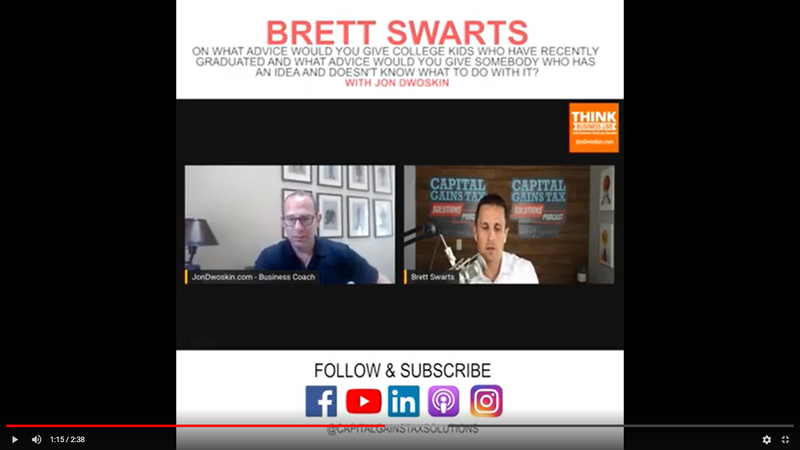
Jon Dwoskin:
What advice would you give college kids who have recently graduated? And what advice would you give somebody who has an idea and doesn't know what to do with it?
Brett Swarts:
Sure, for the first one, it’s learning to work harder on yourself than you do on your job we're taught to go to school and get a degree, and to graduate and to have that, but it's so focused on just education and or just sports or just getting that and then you attain that, but really, I think the value of education is teaching you how to learn and also help you to accomplish a goal. But more than that, focus your attention now on learning to work harder on yourself than you do on your job. Learn to work harder on yourself than you do on attaining this new job. Work harder on yourself. And then whatever this is for you? If you work hard at your job, you'll make a living, and that's totally fine. But if you work harder on yourself, you'll make a fortune. And this is not by me, this is by a gentleman named Jim Rohn, who's much, much wiser, and he passed away. But he's amazing, and so the idea is to work on your health, your finances, your personal development, your leadership, your spiritual law, your relationship with your friends and family. Also, your career, also your education, these are kind of the seven, eight major areas of your life. And so make sure you're spending major time on those major things. Don't just focus on just getting that job, the job will come to continue to add the value of growing yourself and buy out of that people, and the world's going to need you and make sure you're focused on your highest and best gifts too. You know, that's another thing I think I've learned along the years, like when you're in your sweet spot, and you're focused on your gifts, that's when you can be the biggest blessing to the world. So I believe we've all been given these God-given gifts and the top one or two are given to us to bless others. When we focus on developing those strengths, developing those gifts, and using that to bless others, that's where everything comes into play. So you won't have to worry about automation or you have to worry as much you know, worry about having a career because you're gonna be adding value beyond that, but you've got to focus on that.
Learn more about Deferred Sales Trust
Visit: www.capitalgainstaxsolutions.com
 Post: How To Start a Business Inch by Inch During a Crisis
Post: How To Start a Business Inch by Inch During a Crisis
- Specialist
- SAINT AUGUSTINE
- Posts 261
- Votes 26

Jon Dwoskin:
So talk a little bit about like you can do full time, you can do part-time, you can, like you sai you kind of start off you listen to your clients, you beta test this, people started asking, like, talk about how you can kind of tell the people listening, you know how to start a business inch by inch during a crisis?
Brett Swarts
Great question. It was definitely granular. It wasn't immediate. It took time. I'm more like the tortoise and the hare? Why do I want to be the tortoise? So, even when I started Marcus and Millichap it took me a while to understand brokerage and sell my first deal. And, I mean, it was not easy? So that's the biggest thing, it's not gonna be easy, but, also realize that it's a marathon, it's not a sprint? I think in the age of instant, everything's going so fast. You just have to maintain your vision, and you have to maintain what you set out for your goals. So, it's definitely was a journey and it still is, we're always adapting, we just launched the podcast a few months ago. We are hiring and growing the company. I guess it's not an easy answer exists, I just have a compelling vision to keep moving forward with what I believe in and what I'm doing right and so and then bringing on the professionals and the mentors alongside you, the coaches like yourself, Jon, you're my personal coach now the masterminds that I'm in the support groups that I have all of that and the essence is growing yourself right? That's the biggest thing I think about this business entrepreneur journey if you're truly gonna go 100% all-in on yourself and your income being dependent upon a business. It will pull you in places and is a great way. But it also forced you to face some challenges and so I wouldn't have any other way right, just growing up. That's just kind of who I was at two degrees and a minor in playing college sports and in high school sports like I just have always loved the challenge. I've always loved working on teams and growing with the journey along the way with others. So hopefully that answers the question.
Learn more about Deferred Sales Trust
Visit: www.capitalgainstaxsolutions.com
 Post: How Brett Took His Idea and Then Created a Business Out of It
Post: How Brett Took His Idea and Then Created a Business Out of It
- Specialist
- SAINT AUGUSTINE
- Posts 261
- Votes 26
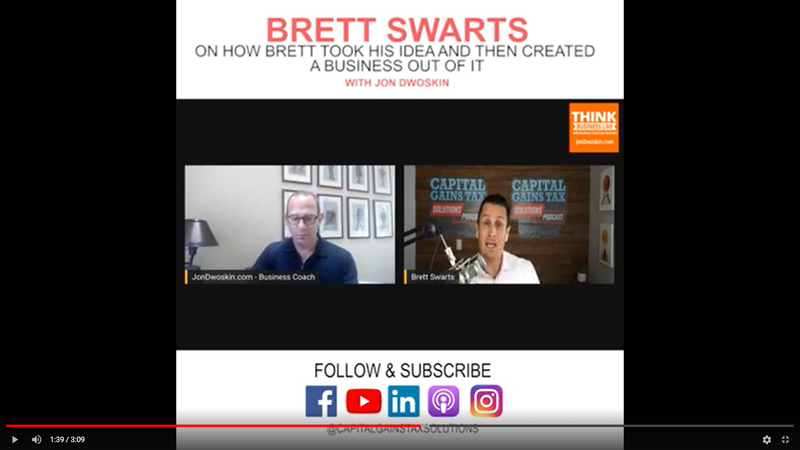
Jon Dwoskin:
As a business owner, you've talked about you’re broker, right? You're in the trenches of doing the broker thing. Then you have this idea, which I think a lot of people right now in the world are having ideas and more so than ever before, that the ideas are bridging to businesses. So talk to me about kind of where you were, where you and then kind of how you took your idea and then created a business out of it?
Brett Swarts:
Great question. You know, I think it's a mixture between calling, timing, your background, your expertise. And it's sort of been an absolutely amazing journey, even just launching the podcast and getting a chance to meet you on the podcast. So for anyone who's listening, considering that highly recommend you get an opportunity to connect with people through a podcast platform. It really stemmed from my clients, 2008 crash Jon, I mean, it started when people lost everything or half of their wealth and had to claw back for 10 years, right, because they felt trapped. And so seeing that pain and the kind of the blood in the streets, if you will, in Northern California, Sacramento is one of the hardest-hit cities in the nation. Sa friends, a family losing everything I'm going, there's got to be a better way. So it started with a deep challenge in paying for my clients and seeing them go through that, helping them through that and being on the other side of it, where they're 10 years older, and saying, Okay, now is the time to help them with their wealth transferred, right? Because in fact, according to the American Bankers Association, 50% of America's net worth is tied to high in primary homes, investment, real estate, and businesses or private equity. Right. And so they're looking to get out of all of that and transfer it but they're faced with that 30 to 50% of tax. So it's getting granular, but it's also getting the big picture. And then it was just, I could not help but start the company, right? It was just it was compelling, right? And, and so every single conversation that I was having just kept leading towards, there's got to be a better way or there's got to be a better way, right? And so as applied this to my real estate brokerage business, my business grew right naturally. And then more people started asking me about it, and then I started to train and coach them and then I go, why don't I just do this full time and focus on that like a laser now some clients will still come to me one wants to sell and still want to do a 1031 will still help them with that.
But really, the focus is on training business professionals now empowering them with these strategies so that they can grow their business because I wish I had someone to do it for me. He's my business partner, and he's the co-founder of the Deferred Sales Trust. His name is Robert Binkley. So together, I'm going okay, this is fun. Why don't we do this together? Why don't we work together and why don't we help a lot of people?
Learn more about Deferred Sales Trust
Visit: www.capitalgainstaxsolutions.com
 Post: How Brett Facilitate and How He Work With All The Parties
Post: How Brett Facilitate and How He Work With All The Parties
- Specialist
- SAINT AUGUSTINE
- Posts 261
- Votes 26
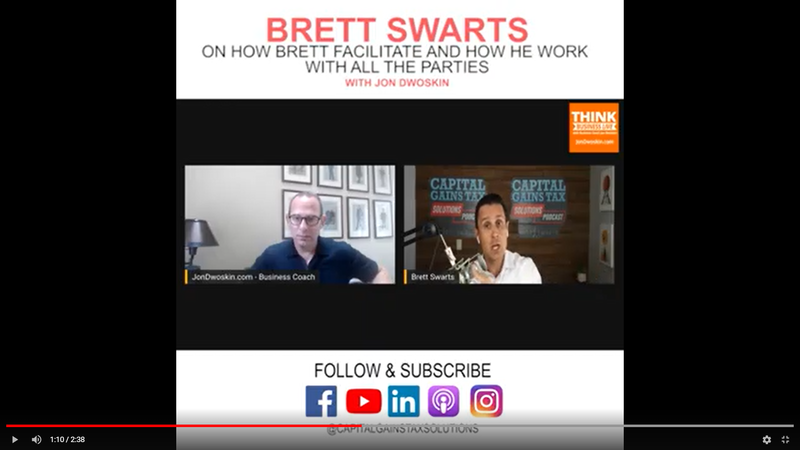
Jon Dwoskin:
Let's talk about maybe the brokers for a minute, because you were a broker. How do you facilitate? How do you work with all the parties? Then how do the parties know when to call you and bring you in?
Brett Swarts:
Great question. I love working in teams. I grew up playing sports and basketball in college. Then I had some of the best training at Marcus and Millichap as an Investment Real Estate Broker, and I still am a broker here in California. I just found that if you know your role and what your objective is, working together is the best way to go about it. So I think of myself as sort of like the offensive coordinator now, you know, because I'm sort of not on the field anymore. As a broker, I'm sort of the guy in the booth, giving the directions to the broker. So the way we approach it is, look, what are you trying to do to add value? What solutions are you providing? To give you a rough example, a lot of brokers will call a client and say, do you want to sell a property? And one of the number one challenges they say is “Sure, I'd like to sell my property if you can find me an upgrade”, or, “Sure I like to sell a property if I knew I didn't have to even go into Real Estate anymore”. In fact, I don't want to trade my current toilets, trash, and liability and the problems that I know, for new problems that I don't know the unknown, and so the key is adding value beyond just 1031. That's the first thing I would say for an actual example.
So we disclosed a deal in Georgia, a $7.6 million property. This gentleman's a baby boomer, he's bought and sold properties for 30 years. So he's looking at a failed 1031 exchange. So we saved his failed 1031 exchange and that brought tremendous value for the broker and the opportunity to keep the client's money working for him versus paying about a million in tax. So we always start with, how are you adding value to your client? And then how can we work together to help educate you alongside Think of it like not knowing what 1031, Jon, was when you first started your career? At a certain point, you didn't know about the 1031 exchange? But then you did. And then once you did, you were able to empower your clients. So that's kind of how we were sort of like an intermediary if you will, or capital gains tax deferral solutions that we were going to give you the options and then figure out how it is going to best apply to your clients.
Learn more about Deferred Sales Trust
Visit: www.capitalgainstaxsolutions.com
 Post: On How Capital Gains Tax Solutions Started with Moneeka Sawyer
Post: On How Capital Gains Tax Solutions Started with Moneeka Sawyer
- Specialist
- SAINT AUGUSTINE
- Posts 261
- Votes 26
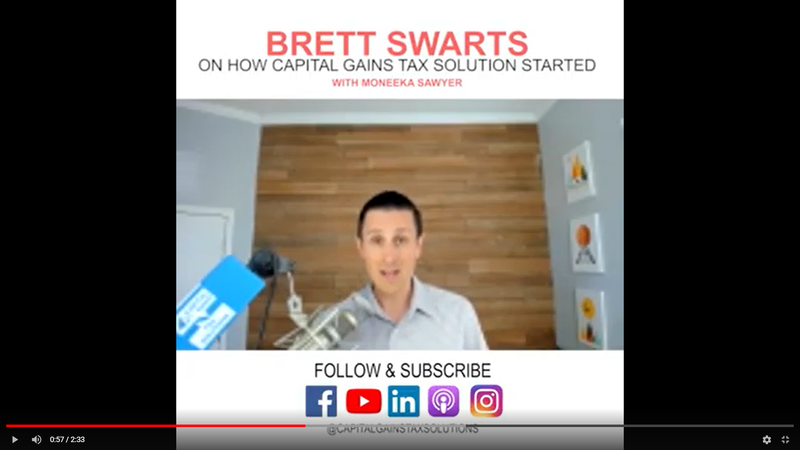
Moneeka Sawyer:
Could you first start by talking a little bit about your story, tell us kind of where you came from?
Brett Swarts:
Absolutely. You know, many commercial real estate owners, they struggled with capital gains tax. I actually started a company called Marcus and Millichap back in 2006, where we help people defer capital gains tax using a 1031 exchange. So we were really focused on helping them create and preserve more wealth, in particular through multifamily if it was my specialty here in Northern California. So we learned about the 1031 exchange on about day three, and 1031 exchange for your listeners, you've probably heard it before, it's just a way to defer tax when you sell an investment, real estate as long as you buy, like kinda investment, real estate. But then something happened during what's called the 2008 crash where the marketplace really shifted, and people got hurt quite a bit. So I had friends, family, and clients, some many lost, most everyone lost something, some lost everything right now, they're all of their net worth. Because in particular, we found that they were forced to overpay for properties via a 1031 exchange, and they felt trapped. They felt pressured, you know, on this 180-day window to take on equal or greater debt for an equal or greater property. And so we set out on admission basically say, how do we help all my friends, family and clients and never have to face this again, and just at the right time, my manager brought in a gentleman to speak on this topic called a deferred sales trust. And so I sat in an office probably a lot of like, a lot of your listeners are sitting somewhere listening. So the first time saying, What is this, you're telling me you can defer capital gains taxes, not using a 1031 not have to go back into real estate immediately. You can do it for a business or a primary home. It's got to be too good to be true, but I kept being in, kept learning, and kept being open-minded to what it could be. Fast Forward 10 years later, after countless deals at 1031. exchanges, Delaware Statutory Trust, Deferred Sales Trust, we're helping a lot of people escape feeling trapped in capital gains tax, and the best part about it is never to have to overpay for a property ever again via 1031 exchange.
Learn more about Deferred Sales Trust
Visit: www.capitalgainstaxsolutions.com




